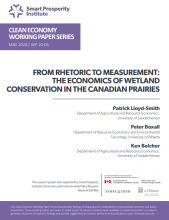May 18, 2020
Wetland conservation is a pressing issue in Canada, with around 200,000 square kilometres of Canadian wetlands lost since the 1800s. This loss in wetlands has been extensively studied by wetland scientists who have determined that these ecosystems provide significant ecological functions which are negatively affected by the losses. The translation of scientific research on wetland function loss into protection efforts has been relatively slow to develop. The emergence of ecosystem service approaches, and the potential to transform the importance of services into economic values, provides a platform for biophysical information to be used to inform wetland protection efforts. Economics can play a key role in quantifying the relevant benefits and costs of wetland conservation and designing effective and efficient policies to align the interests of the landowner and society. Thus, it is the purpose of this paper to synthesize the current knowledge about wetland conservation economics in Canada, with a focus on prairie landscapes. The paper synthesizes the literature on the costs of wetland conservation and discusses the methods economists have used to uncover various wetland supply curves. It then discusses wetland benefit valuation and outlines the wetland ecosystem service conceptual framework, reviews the demand for wetland ecosystem services, and discusses the characterization of economic benefits of wetland conservation. It outlines the main approaches used in wetland valuation, discussing their strengths and weaknesses.
The Clean Economy Working Paper Series disseminates findings of ongoing environmental and clean economy work conducted by researchers from a range of disciplines. These working papers are meant to make results of relevant scholarly work available in a preliminary form. Although these papers have not undergone a peer-review process, they meet general standards of scholarly excellence. The views expressed in these working papers are those of the authors and do not necessarily reflect the opinions of Smart Prosperity Institute.



